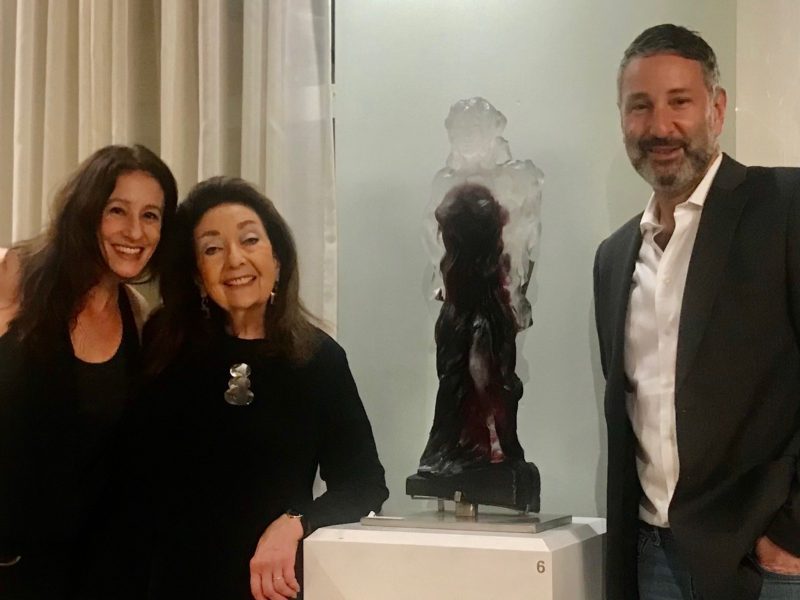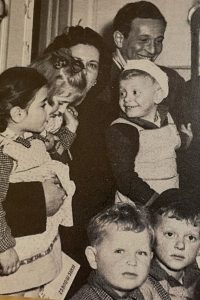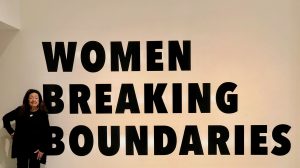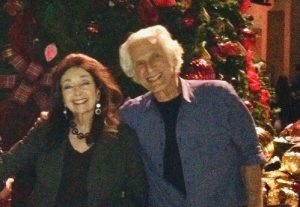David Harris

Why I Give: After 14 Cities in Six Countries, Margot Gotoff Finds Cincinnati Her Home
“I’m very proud of what my people have accomplished, I really am,” stated Margot Gotoff during a recent video chat. She was talking about why she identifies so passionately as a Jew. “We are strong. I think of all of those who suffered during the Holocaust, and who lived—they raised their children up to be strong and to go forth.”
Her story as an American Jew began when both sets of her grandparents immigrated to New York from Russia, and thrived despite hardships. “I think of my grandfather who came to this country on a boat. He was supposed to inherit his uncle’s factory. When he got to Western New York, he didn’t know much English and they gave him some papers to sign. He didn’t know what they were, and he signed away his ownership and he became a laborer in the factory. But he brought up his seven children—one of whom was my father—to work, to do, to dream.”
Both of Gotoff’s parents were born in Buffalo, New York, and she was born in Rochester. In 1944, her father, Israel Gaynor Jacobson, was asked by the Joint Distribution Committee to travel to Prague to help Holocaust survivors.
“My dad was trained as a social worker and he had been head of the Jewish Family Agency in Rochester. He was asked to go on the radio to make a 15-minute weekly response to Father Coughlin, who was this virulent antisemite and said horrible things. Because of that, he came to the notice of the Joint Distribution Committee and began his decades-long career.”
As she observed the work of her parents, Gotoff developed a firsthand understanding for why supporting the Jewish community is so important. She explained that she gives every year to the Jewish Federation because she knows that she is supporting not just our local community, but also the worldwide community of Jews through our overseas partners (including the Joint Distribution Committee, where her father played a leadership role). She is proud of this wide-ranging impact, from Jew to Jew, all the way around the world.

In 1946, Gotoff, who was five years old at the time, her mother, and her two-year-old sister joined her father in Prague. “As a five-year-old, you are pretty aware, and when we arrived in Prague, I remember seeing bombed out buildings. Sometimes people would come up and would want to touch two little Jewish girls because they had lost their children, their grandchildren. Of course, I had no idea of the work my parents were doing. I only found that out later.”
The family traveled to many cities around Europe helping relocate displaced survivors. Gotoff’s mother, Florence, was also a trained social worker, and worked alongside Gotoff’s father in his roles. She reached out to the University of Buffalo to get advice about how to quickly train social workers to help the influx of survivors in the newly opened borders. Gotoff remembers her mother was constantly visiting children in orphanages, making sure they were getting food, love, and care.
When she was around 12 years old, the family was once again back in New York when her parents invited a Holocaust survivor over to their house. “I don’t remember her name, but I remember her telling my parents that she was pregnant in the concentration camp. She had to keep it secret from the guards, otherwise they would have killed her. Somehow she managed to hide giving birth, but the minute she had the baby,” here she paused, “once she gave birth, she broke the neck of the baby and killed it. It’s something I’ve never, ever forgotten.”

After all these impactful experiences, Gotoff decided to follow in her parents’ footsteps and sought a degree in social work. However, when she began taking sculpture at night, she discovered her true passion. “I loved it, I had found my calling. I’ve taught at the Art Academy. I’ve taught at my studio, and that’s what I’ve done my whole life—besides being married and having two wonderful children.”
Gotoff, like her parents, moved around a lot—and it was in Boston that she met her late husband, Harry, “He was a young professor at Harvard; in Classics, Latin and Greek,” she recalled. They moved to Rome so Harry could write a book. In 1986, the very renowned Classics department at the University of Cincinnati offered Harry a position. “And what did we know about Cincinnati? Nothing.”
After arriving, Gotoff found friends at the Contemporary Club. “It was started by a group of Jewish women more than one hundred years ago because they weren’t invited into any other group. Being involved in that group opened up Cincinnati for me.”

Gotoff and her family were not involved in the Jewish community in a traditional sense, but that hasn’t stopped her from supporting the Jewish Federation and Jewish causes. “I feel I’m very Jewish, I totally identify, but I don’t feel that I have to be a certain way. And that’s why I love the Federation, it does so much for so many. It doesn’t care how you engage with Judaism because it realizes Judaism is not a one-size-fits-all religion.”
After all that she has seen—not just the places, but all the people she has met, stories she has heard, and firsthand experiences of suffering, Gotoff feels a profound obligation—like her parents—to help. This is why she gives. Gotoff talks of her identity as a Jew and her connection to the community—local, national, and international—with pride.
When asked if she considers Cincinnati her home, Gotoff reflected back on her life and her experiences. “I do feel like Cincinnati is home. But I wouldn’t give up my strange past. You know when you skip a pebble across the water? That’s kind of like my philosophy on life. Just throwing it out and not knowing where it goes. And, things can happen that are really interesting, that you never expected.” How lucky we are that Gotoff’s pebble landed in Cincinnati.
Thanks for caring about our community and what we do.
Stay connected: sign up for our newsletter here.

